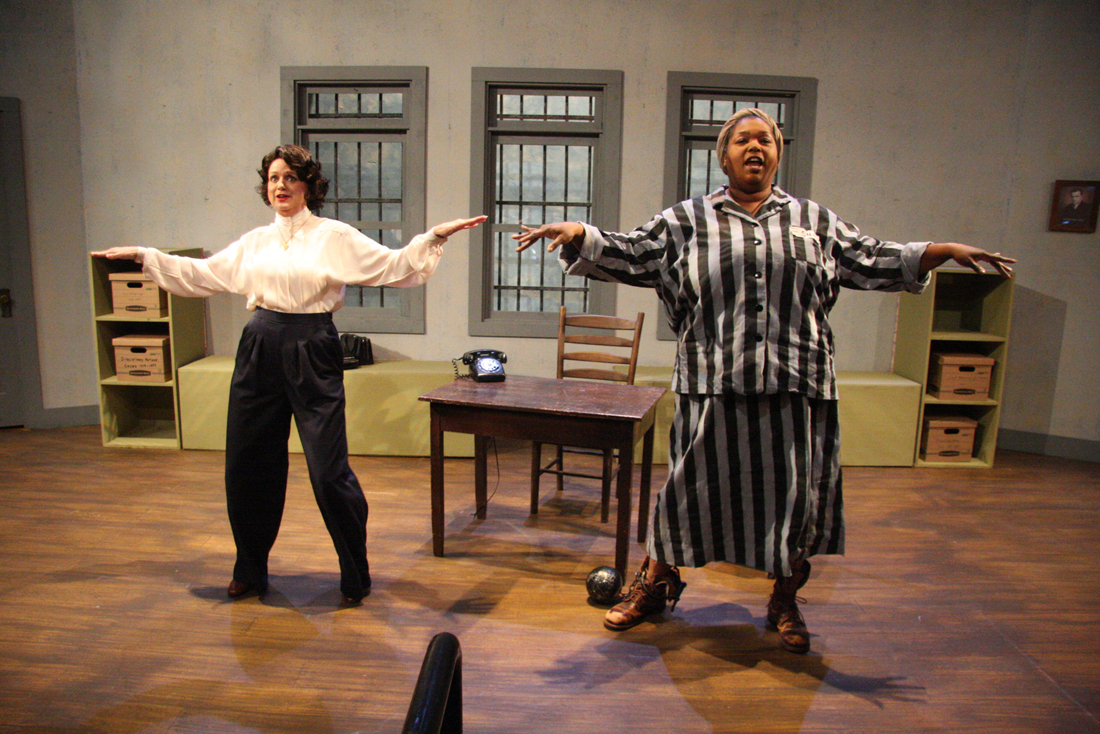“You are an authentic doorway to the past,” Susannah (Lana K. Hoover), an Anglo song collector for the Library of Congress, tells Pearl (Liz Mikel), an African-American prisoner in a Texas jail in the 1920s. The white lady means it as a compliment, but the black woman is understandably suspicious. After all, the folk musicologist has invaded Pearl’s squalid cell in search of nearly forgotten songs from America’s past and is offering only cigarettes and dollar bills in exchange for tunes Pearl learned from her parents, who were former slaves in South Carolina. The illiterate black woman, unused to attention from white people with fancy Ivy League degrees, doesn’t want to give away too much too soon for too little. She must use all her hardscrabble instincts to figure out when she’s being manipulated –– and when she can do a little manipulating herself to turn this unlikely musical collaboration to her benefit.
I’m happy to report that Jubilee Theatre’s marvelous staging of Black Pearl Sings is more than the easy feel-good tale of an indomitable African-American woman who triumphs over a racist society. A lot of tough questions get asked in the show, and there are no simple answers. At what point do celebrations of diversity become cultural exploitations? How much should a minority group surrender its unique identity in the name of social progress? When does an extraordinarily gifted black singer become, in Pearl’s words, “a dancing chicken” for the white academic elites who prize her pain and oppression as tokens of “authenticity”?
Director Akin Babatunde finds all the juicy dramatic complexity in playwright Frank Higgins’ script and guides his two lead actors straight into the wonderful messiness of it. The result is a rare and utterly satisfying theatrical experience — a show as passionate as it is thought-provoking, a meditation on race relations in America that bypasses political platitudes for a more nuanced look at how two very different women negotiate the huge social gulf between them.
As advertised, Black Pearl Sings is a play with music, which is not the same thing as a musical. Unlike most Jubilee stagings, in which the tuneage has a prominent role, there’s no backing band or recorded soundtrack in this show. The production features a combination of well-known and obscure songs from a fascinating variety of sources, including the cotton fields of the South, the front porches of Appalachian shacks, and the big-city meeting halls of union laborers. All renditions are delivered a capella by Mikel and Hoover in the course of their characters’ conversations, and they weave into the narrative with surprising ease and grace.
The play’s design is simple. The first act recounts Susannah’s discovery of Pearl’s powerful vocal gifts and repertoire of folk tunes from her South Carolina childhood. Susannah uses all of her professional influence — and a few personal connections — to free Pearl, who’s served 10 years in the clink for killing a man in self-defense. Act Two takes place in a Greenwich Village apartment where Susannah and Pearl are staying while “Black Pearl,” as the press has dubbed her, takes New York academic and bohemian circles by storm. (Wondering aloud about her new stage name, Pearl notes to her scholarly benefactor, “Your name ain’t ‘White Susannah.’ ”) Both women hope to use their sudden fame to fulfill personal dreams. Pearl wants to be reunited with her errant daughter, while Susannah pursues an elusive Harvard faculty position — but unexpected complications pop up at every turn.
Director Babatunde has cast two seasoned performers with diverse theatrical resumés and gives them plenty of room to command the stage, though neither indulges in the kind of diva-ish bombast this script could’ve easily encouraged. Mikel has been a mainstay on the North Texas stage — especially in musicals — for many years now, and the character of cantankerous but tender-hearted Pearl could’ve been written specifically for her. Unsurprisingly, she aces both the big musical moments and the small dramatic contradictions of the role. Less well known is Hoover, a veteran improv comic and character actor, but she more than holds her own opposite Mikel. The personal sacrifices that Susannah has made for her academic career — particularly as a single, childless woman in the 1920s — register just as strongly as Pearl’s more obvious struggles with racism and marginalization. Black Pearl Sings is all about people trying to find a meaningful place in a world of rapid and sometimes violent social change. In that sense, Pearl’s songs stand in for the precious gifts that help all of us maintain our hard-won identities.
[box_info]
Black Pearl Sings
Thru Feb 24 at Jubilee Theatre, 506 Main St, FW. $12-15. 817-338-4411.
[/box_info]












